Estimated Reading time

6 Mins
Na̲nwak̲olas Council Celebrates Guardian Graduates
Through the Stewardship Technician Training Program, Indigenous students gain skills, knowledge, and confidence to support them in taking on Guardian and stewardship roles in their traditional territories.
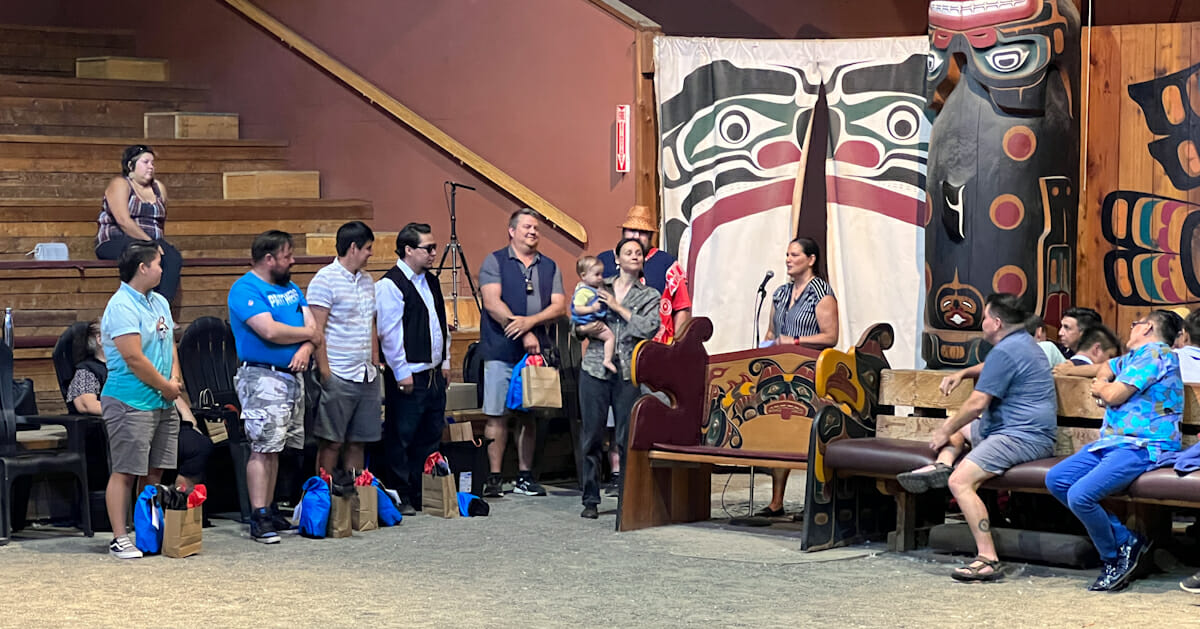
Spirits were high at the Kwanwatsi Big House as family members, community leaders, and partners filled rows of seats to celebrate and recognize graduates of the 2020/2021 Na̲nwak̲olas and Vancouver Island University (VIU) Stewardship Technician Training Program (STTP). About 100 people attended the June 12 ceremony to recognize graduates’ achievements and share words of encouragement for their continued success.
The graduates completed their coursework in 2021 and, with COVID-19 restrictions still in place, received their diplomas in a 2021 ceremony held over Zoom. Last week’s ceremony provided an opportunity to celebrate 10 (out of 16) of the graduates in the Big House with their children, siblings, parents, Elders, and elected and hereditary leaders there to clap, share stories, and celebrate with hugs, songs, drumming, and dancing.
Wei Wai Kum elected Chief Councillor Chris Roberts opened the celebration by thanking the graduates for persevering through a difficult year and for their “fortitude to stick through an already very challenging program.”
“[Students], you had a lot of demands on you to meet the academic expectations and to meet changes in your lives and commitments from families,” Roberts said. “But to do that, with the pandemic crashing into our worlds and changing everything, I think you all deserve a round of applause for how you were able to get through that.”
The Role of a Guardian
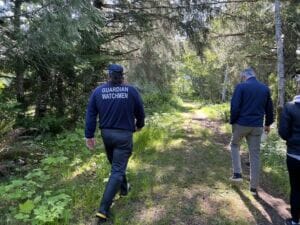
In his words to STTP graduates and supporters, elected Chief Roberts pointed to the many responsibilities Guardians carry, and the successes they’ve contributed to, including inventorying Large Cultural Cedar, protecting forests from tree poachers, conducting research, gathering data to support decision-making, building relationships with partners and agencies, and much more.
“Our Guardian programs have grown, and they continue to grow in size and scope,” he said. When a forestry operator illegally harvested $226,000 worth of timber from Wei Wai Kum territory, Guardians reported the theft and the Nation used Guardian data to appeal the Forest Practices Board and increase the fine for timber poaching. “Without our men and women out in the field, doing the very difficult jobs that you do on a daily basis, that would not have happened, we may have not otherwise even known about it.”
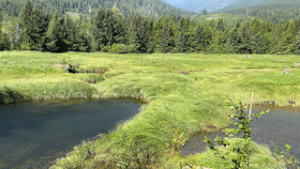
Dallas Smith, a Tlowitsis member who serves as President of Na̲nwak̲olas Council and Chair of Coast Funds, reminded the audience of the decades of work that have gone into forming Na̲nwak̲olas, securing protections and financing through the Great Bear Rainforest agreements, and establishing Guardian programs and the Ha-ma-yas Stewardship Network.
“Years of mobilization on everything from land use planning to stakeholder engagement has resulted in our ability to have our own boots on the ground,” Smith said. “There’s a sense of pride I’m feeling in my heart today…seeing my nephew’s nephews picking up the torch and being there when they’re needed.”
Recognizing Graduates
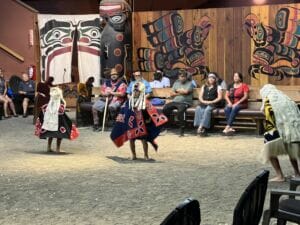
During the graduation ceremony, Xanusa’mega Charlene Everson, who supported the students as the STTP program coordinator, shared stories from the program and updates on each of the graduates’ journeys since completing the program.
“Every [student] had their thing that was really easy for them and every student had something that was a little bit more difficult,” Everson said. During the ceremony, she introduced each of the students personally and reflected on the talents and strengths they brought to the class.
At the front of the Big House, Na̲nwak̲olas staff and member Nation leaders recognized graduates with gifts, stories, heartfelt thanks, and big hugs. Many of the graduates took the opportunity to share their reflections on the program, the importance of stewardship, and their plans for the future.
“We had incredible teachers and incredible support staff to really make sure that every student succeeded in this program, and that made it really special for everyone,” said Candace Newman, a member of K’ómoks First Nation. “I think that this work is incredibly important for our Nations. And like [elected Chief] Chris said, to have our representation out on the land is really powerful. I’m really proud of all of the other students and of future students that are going to take part in this work.”
“I went into the program and I remember the first thing I said was ‘let’s save our salmon,’” shared Krystal Henkel, a We Wai Kai member who brought her young daughter and “biggest accomplishment,” Lennox “Lani” Rachelle Wolfgang, to the ceremony with her. “Salmon are sacred. I’m so concerned about which way this is going and that was where my heart was…Without salmon, none of us would be here. That’s what our Elders survived on, our ancestors.”
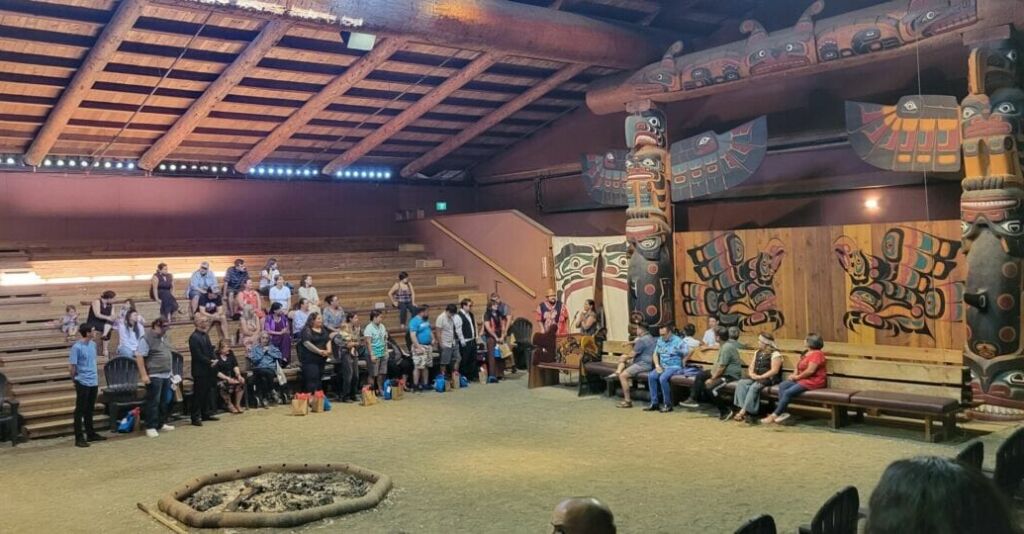
After completing STTP, David Cliffe went on to become the Guardian Manager for his community, the Wei Wai Kum First Nation. It’s a responsibility he takes very seriously and, in his new role, he’s dedicated himself to supporting his team to develop their skills and take on new challenges.
“We’ve got eight employees and we keep growing every day, taking on more responsibilities, more training, and just building partnerships and connecting more with people…and educating [them] to make better informed decisions,” Cliffe said.
Some students chose to build on what they’ve learned in the STTP and pursue further education in a related field. During the ceremony, Christina “Beans” Green from Tlowitsis First Nation shared that ‘arc week’ with professional archaeologist Sean Connaughton helped them confirm that archaeology was the right path for them.
“I’d had some experience with archaeology surveys when I was on board with the Tlowitsis Guardians, and then we had a preview in class and it showed me what it was that I wanted to pursue,” said Green, who recently finished her second year at VIU, where they’re studying for a BA in Anthropology. “Being able to try it out [in STTP] was amazing.”
After each of the graduates was recognized, Chief Roberts invited graduates, supporters, and community members to join a Mamulakwala celebration song and dance to honor their success, followed by a feast at Thunderbird Hall.
“This Program is a Community Builder”
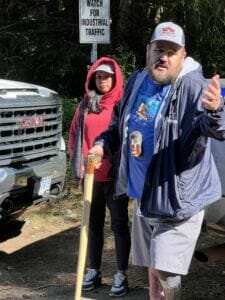
The Stewardship Technician Training Program (STTP) is a full-time, 20-week program delivered through Vancouver Island University in close partnership with Na̲nwak̲olas Council. The program blends classroom and field learning focused on water and land monitoring, communication skills, archaeological inventory techniques, forest resource management, and vessel operation. For many students, the STTP experience affirms their cultural connection to their work and territories and creates opportunities for sharing the knowledge and skills they bring to the cohort.
“This program is a community builder,” Chief Roberts said in his remarks. “It builds relationships and connections that are so important to us as a people, both culturally but also how we live our lives in a modern context and how we relate to one another. And this program does that between individuals, between professionals and practitioners, as Guardians of the territory. But it also helps us work together at a Nation level of connection with one another.”
Through their partnership with VIU, Na̲nwak̲olas Council has delivered three STTP cohorts, supporting about 50 Indigenous learners to build the knowledge, confidence, and connections needed to succeed as Guardians.
“We didn’t get here by ourselves. There’s been some partnerships that have helped us along the way: I think of the discussions with VIU over the years, and the work and refinement of these programs as we’ve gone forward,” said Smith.
“[Today,] there’s a real network [of Guardians] up and down the coast that I’m proud to say we’re a part of.”
2020/2021 STTP Graduates
- Chip Mountain (Mamalilikulla)
- Thomas Levac Jr. (Mamalilikulla)
- Christina “Beans” Green (Tlowitsis)
- Mike Stadnyk (Tlowitsis)
- Stephen Glendale (Da’naxda’xw Awaetlala)
- Steven Glendale (Da’naxda’xw Awaetlala)
- David Cliffe (Wei Wai Kum)
- Wamish Roberts (Wei Wai Kum)
- Krystal Henkel (We Wai Kai)
- Terri Wells (We Wai Kai)
- Cedar Frank (K’ómoks)
- Caelan McLean (K’ómoks)
- Candace Newman (K’ómoks)
- Zeb Savoie-Velos (K’ómoks)
- Charles “Judge” Humchitt (Kwakiutl)
- Jacob Nelson (Quatsino)
